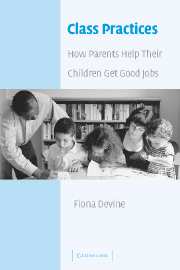Book contents
- Frontmatter
- Contents
- List of tables
- Acknowledgements
- 1 Introduction
- 2 Material help with education and training
- 3 Financial choices and sacrifices for children
- 4 Expectations and hopes for educational success
- 5 Fulfilling potential and securing happiness
- 6 Contacts, luck and career success
- 7 Friends and networks in school and beyond
- 8 Conclusion
- Appendix A The interviewees
- Appendix B Doing comparative research
- Notes
- List of references
- Author index
- Subject index
7 - Friends and networks in school and beyond
Published online by Cambridge University Press: 22 September 2009
- Frontmatter
- Contents
- List of tables
- Acknowledgements
- 1 Introduction
- 2 Material help with education and training
- 3 Financial choices and sacrifices for children
- 4 Expectations and hopes for educational success
- 5 Fulfilling potential and securing happiness
- 6 Contacts, luck and career success
- 7 Friends and networks in school and beyond
- 8 Conclusion
- Appendix A The interviewees
- Appendix B Doing comparative research
- Notes
- List of references
- Author index
- Subject index
Summary
In Chapter 6, I drew on Coleman's work on social capital and the way in which parents use their social networks of interpersonal relations in the local community as a resource to help their children in the education system. According to the interviewees, both middle-class and working-class parents mobilised their social resources to their advantage. I also drew on Granovetter's ideas about the importance of social contacts on careers and considered how the interviewees of different class backgrounds mobilised their own social contacts in becoming medics and educators. The interviewees of upper-middle-class and middle-class origins could certainly draw on their parental social networks but so could my informants of more modest social status. Once again, I now consider my interviewees as middle-class parents mobilising their social resources to ensure their children's educational and occupational advancement. Given that most of my interviewees' children were still making their way through the school system in both countries, attention focuses on social capital and educational success. The role of social contacts in the forging of new careers among the interviewees' older children will be considered more briefly. Attention is not limited to the ways in which social resources come into their own only when academic success is not forthcoming. This is in contrast to both Goldthorpe and Bourdieu who viewed them as important only in terms of a strategy of last resort. Rather, I will consider how social resources are mobilised, indeed deeply embedded, in the process of acquiring educational credentials as well.
- Type
- Chapter
- Information
- Class PracticesHow Parents Help Their Children Get Good Jobs, pp. 146 - 170Publisher: Cambridge University PressPrint publication year: 2004



